Doctors Without Borders resumes Gaza City operations amid ceasefire, but situation still 'horrific'
MSF's emergency coordinator for Gaza, Claire Manera, tells CNA's Asia First that aid blockages, destroyed hospitals and unsafe conditions are making it nearly impossible to meet the enclave's massive medical needs.
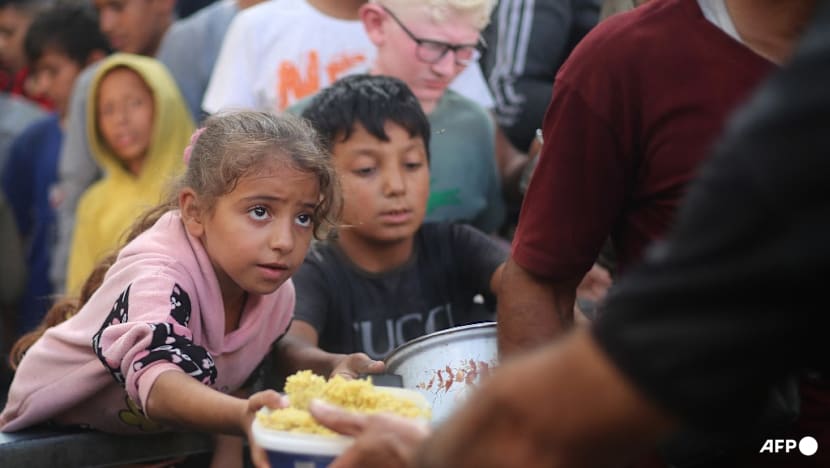
A Palestinian girl receives a hot food portion from a charity kitchen in the Nuseirat refugee camp, located in the central Gaza Strip, on Oct 21, 2025. (Photo: AFP/Eyad Baba)

This audio is generated by an AI tool.
GAZA CITY: Medecins Sans Frontieres (MSF), also known as Doctors Without Borders, has cautiously resumed limited medical and humanitarian operations in Gaza City, after weeks of forced suspension due to heavy fighting.
In a statement on Thursday (Oct 23), the medical charity noted that displacement movements “from south to north” have exceeded 400,000 since a fragile ceasefire between Israel and Hamas began on Oct 10.
These movements reflect people moving back from the southern Gaza Strip toward the north - where Gaza City is located - but they are not permanent returns, “as not everyone making the journey stays in the north”, the organisation added.
“After careful monitoring and assessment, MSF has partially resumed its activities there, as we continue striving to go where patients are.”
But staff on the ground say the health crisis in Gaza remains catastrophic.
Speaking to CNA’s Asia First programme, Claire Manera, MSF’s emergency coordinator for Gaza, described the situation as “horrific”, with aid still blocked and the lives of humanitarian workers remaining at risk.
“NEEDS ARE MASSIVE”
In its statement, MSF said that it was forced to leave Gaza City on Sep 24 amid intensified Israeli strikes aimed at dismantling Hamas.
Following the truce, the organisation reopened its wound care clinic in the city on Oct 15 to treat many who had been without access to proper care and dressings for weeks.
“Since then, our teams have received more than 640 patients - the majority of them with trauma-related injuries,” the statement said.
But aid remains scarce, Manera told CNA.
The World Health Organization has urged the reopening of the Rafah border crossing between Gaza and Egypt, where a significant amount of aid is currently stuck.
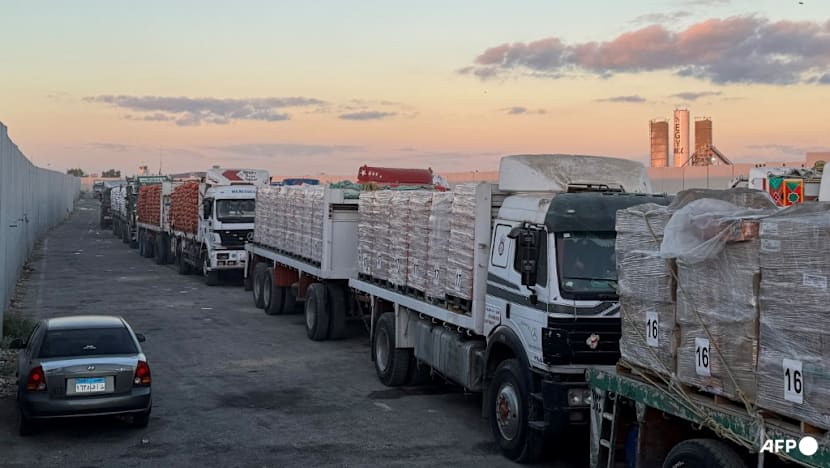
The rate of transfers slowed to a trickle when Israel seized control of the crossing and closed it in May last year.
“We still have more than 200 tonnes of medical equipment at the border, and the impediments by the Israeli authorities continue, so we're not able to bring this aid in at scale,” said Manera.
“The levels of malnutrition are extremely high. The burn victims from the bombings, they cannot heal. The children are suffering because you need a lot of calories to recover from third-degree burns. The situation is horrific,” she added.
“Before the conflict, there were 600 trucks a day coming into Gaza. Now, with more than 94 per cent of the health facilities destroyed, the needs are massive. So, 600 trucks are not enough. (But) we're not even seeing 600 trucks a day.”
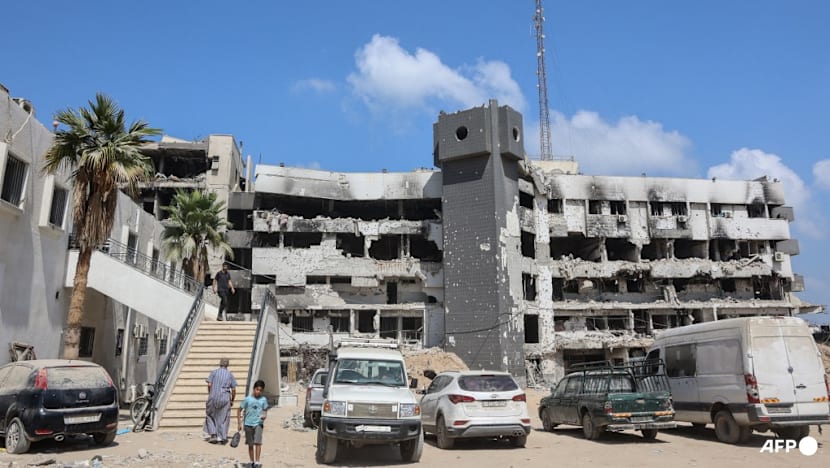
AID WORKERS UNDER FIRE
Even as operations resume, the risks remain immense for humanitarian workers. Manera described the environment as “terrifying”, where aid workers are not spared from violence.
MSF’s most recent fatality was on Oct 5, when 43-year-old staff member Abed El Hameed Qaradaya succumbed to shrapnel injuries sustained in an attack on Oct 2, which had killed his colleague Omar Hayek and injured several others.
They were among the 15 MSF workers who have been killed since the war in Gaza began on Oct 7, 2023. Manera called the toll a violation of international humanitarian law.
“It is still a terrifying situation in Gaza. When I was there and managing the security of the teams, we would provide information to the Israeli authorities of where our teams will be every day to keep them safe,” she said.
“But what we've seen is that our colleagues are still being killed. To have to work in these conditions when there's no assurances is really impossible.”
Manera added that even hospitals were not spared from attacks, with rockets and bombings around the facilities making it impossible for staff to work safely or for aid trucks to reach them.
Related:
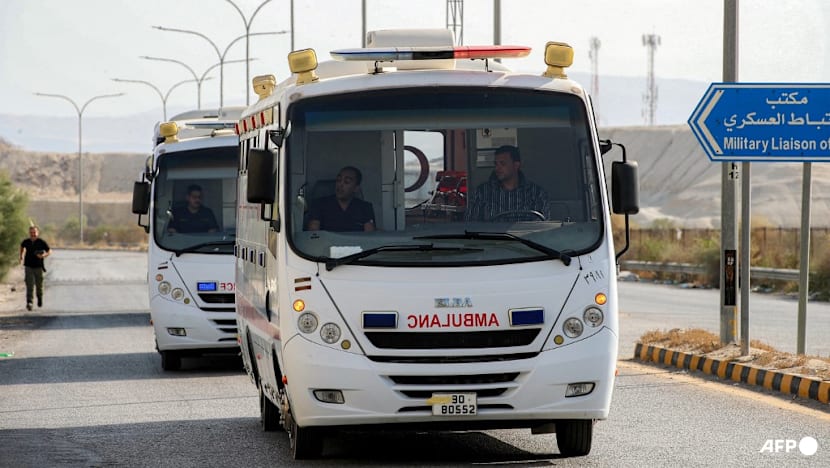
HEALTH CRISIS
Manera also highlighted that the situation remains dire for patients who require medical evacuation outside the enclave. These include those suffering from cancer or who need dialysis.
There are more than 15,000 people who require medical care outside of Gaza, she added.
“Just in July and August alone, there were 740 people who died waiting for this medical evacuation, and one in five of them were children,” she said.
Evacuations are controlled by Israeli forces, she said, “so we are not free to have people come out as fast as they need, and it's still not safe to do so.”
Many patients with burns and other injuries are also developing infections from the lack of clean water and sterile supplies.
“The wounds are basically rotting away, and this can turn into chronic conditions,” she added.
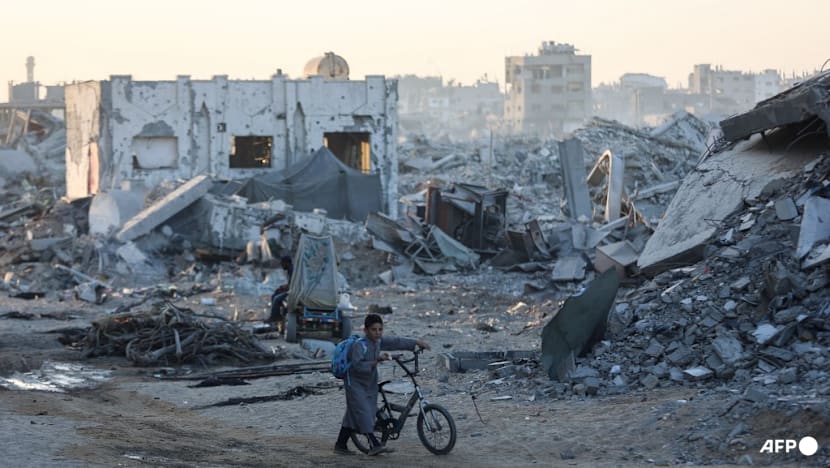
MSF’s primary healthcare centre in the Sheikh Radwan district was also found partially destroyed when teams returned earlier this month, the organisation said.
It has resumed water trucking operations in Gaza City since Oct 14, delivering between 90,000 and 180,000 litres of drinking water daily across nine to 14 distribution sites.
“We are currently assessing the possibility of further expanding these operations, as more people return from the south and face limited access to safe water in Gaza City,” MSF said in its statement.
It also continues to remotely support Gaza’s Al-Helou Maternity Hospital and Al-Shifa Hospital with incentives, supplies and fuel.
“THEY COME TO WORK EVERY DAY”
Despite the odds, Manera said she draws hope from the resilience of her Palestinian colleagues.
“What drives me is the Palestinian people. They are some of the bravest people I've ever met,” she said.
“We have more than 1,000 Palestinian staff, and they come to work every day. They are homeless, they don't have enough to eat, they don't have safe water to drink, but they get up and they come to work.
“When they're doing that, how can I not do that? And how can the world look away?”















